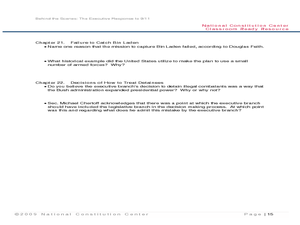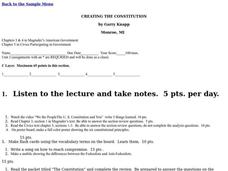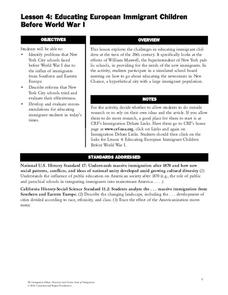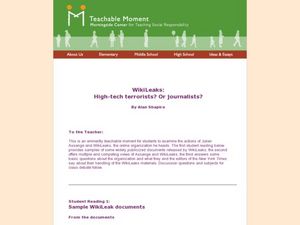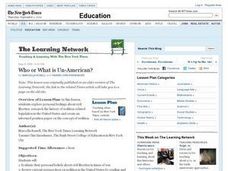C-SPAN
Electoral College Pros/Cons and Alternatives
If every vote counts, why do we need the electoral college? Middle and high schoolers study the Constitutional precedent of the electoral college, as well as its place in historical and modern elections, with an engaging social studies...
Curated OER
Do Suspected Enemies Have Rights?
Students investigate the history of Japanese immigration. They complete an online Webquest, explore various websites, answer discussion questions, and locate and read newspaper articles about enemy compatants.
Curated OER
Behind the Scenes: The Executive Response to 9/11
Students examine the actions of the executive branch following the September 11th terrorist attacks. In this U.S. government lesson, students watch segments of a video titled "Behind the Scenes: The Executive Response to 9/11." Students...
Curated OER
Executive Orders
Students interpret historical evidence presented in primary and secondary resources. In this foreign policy lesson, students examine U.S. foreign policies of Presidents since World War II. Students prepare PowerPoint...
Curated OER
The Right to Remain Resilient
Students examine the Civil Rights Movements in the U.S., both current and historic. In small groups students investigate a specific civil rights group, create an illustrated timeline, noting key events, people, and state and federal laws.
Curated OER
CREATING THE CONSTITUTION
Learners engage in a variety of activities aimed at strengthening comprehension of the Constitution. The activities are part of a layered curriculum and students create a portfolio for assessment.
Curated OER
California's First Constitution
Students read excerpts from speeches made at the California Constitutional Convention. They predict what the state constitution say about slavery and other issues concerning race.
Judicial Learning Center
The Power of Judicial Review
Marbury v. Madison is arguably the most important landmark case in the history of the Supreme Court. A fact-filled lesson provides background information about the case and two others related to the concept of judicial review. Scholars...
City University of New York
Electoral College
A presidential election is a lot like the 2004 World Series, and it's also a lot like choosing an orange in a paper bag. Apply the process of the electoral college to these two analogies with a set of lessons about government...
Curated OER
The Federalist Debates: Balancing Power Between State and Federal Governments
Middle schoolers examine the pros and cons of state sovereignty vs. federalism, as argued by the Founding Fathers. They identify the basic positions of each side, complete a worksheet, and write a persuasive essay arguing for Jefferson...
Curated OER
Breaking News English: France Rejects European Constitution
In this English worksheet, students read "France Rejects European Constitution," and then respond to 47 fill in the blank, 7 short answer, 20 matching, and 8 true or false questions about the selection.
Curated OER
High Crimes and Misdemeanors
Students analyze the Constitution's wording regarding impeachment and discuss the impeachment process. They then design a survey based on student-generated questions about the charges against President Clinton and write a letter to the...
Curated OER
Tally of the 1824 Electoral College Vote
Twelfth graders study the parts of the Constitution that address presidential election. They complete a variety of activities designed to spark debate about the flaws in the Electoral College system.
City University of New York
Presidential Elections and the Electoral College
To understand the controversy surrounding the US 2000 presidential election, class members investigate the rationale behind the Electoral Collage, the intimidation involved in the election of 1876, and the 2004 American League...
National Endowment for the Humanities
George Washington: The Precedent President
Everyone knows that George Washington was the first president, but do your scholars know why that was so important? The lesson plan, the third in a sequence of three, allows learners to understand how George Washington set a precedent...
Constitutional Rights Foundation
Options for Affecting Public Policy
Letter-writing, e-mail and telephone campaigns, petitions, marches, meetings, with lawmakers. Options for influencing elected representatives are the focus of resource that details how to craft each of these approaches to influencing...
Constitutional Rights Foundation
Special Order 40
The city of Los Angeles' 1979 Special Order 40 states: "LAPD officers shall not initiate police action with the objective of discovering the alien status of a person." After reading a fact sheet that details the history of Special Order...
Constitutional Rights Foundation
Educating European Immigrant Children Before World War I
As if surviving a journey to America wasn't enough of a feat for early 20th century immigrants, they then needed to settle into American life. Learn about the ways New York public education attempted to meet the needs of its students,...
Curated OER
Bill of Right in Action
Groups reserach and write about topics given to them by their teacher dealing with the Bill of Rights.
Curated OER
WikiLeaks: High-tech terrorists? Or Journalists?
Students investigate the credibility of WikiLeaks. In this history lesson, students read three WikiLeak articles, then answer questions that relate to each article.
Curated OER
Tribal Sovereignty Mock Trial
Students discuss the issue of tribal/native nation sovereignty. They review the Constitution of the U.S. and discuss how it legally provides for sovereign nations. Then they participate in a mock trial of the 1823 Supreme Court Case...
Curated OER
Who or What is Un-American?
Students explore concepts about civil liberties, research the history of sedition-related legislation in the U.S. and create a position paper on the topic.
Constitutional Rights Foundation
Immigration Enforcement Raids
Class groups take on the role of advisors to the Assistant Secretary of the Office of Policy & Planning of ICE. Their charge is to prepare a report for the secretary on the effectiveness of enforcement actions of the ICE in...
Alabama Department of Archives and History
Alabama's Secession in 1861: Embraced with Joy and Great Confidence. Why?
From December 20, 1860 to June 8, 1861, eleven states seceded from the Union. Alabama seceded on January 11, 1861. Why did so many white Alabamians want to secede? Why did they believe the South could win the war? These are the essential...




